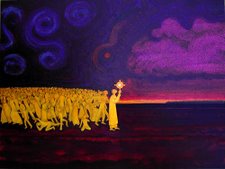During the past few years we have seen much speculation about the rapidly declining state of the Church in Ireland after a series of clerical scandals and a drop in religious practice. Many are wondering if Ireland is still Catholic and where is Ireland going. Fr. Twomey, a Divine Word priest and Moral Theologian at the Pontifical University in Maynooth, offers us an analysis of this situation...
declining state of the Church in Ireland after a series of clerical scandals and a drop in religious practice. Many are wondering if Ireland is still Catholic and where is Ireland going. Fr. Twomey, a Divine Word priest and Moral Theologian at the Pontifical University in Maynooth, offers us an analysis of this situation...
...First, Twomey examines the situation of the Church and Irish culture prior to Vatican II to see if there are any causes beyond dissent and the confusion after the Council to account for the present situation. Due to the loss of independence the Irish had to define their identity primarily in terms of Catholicism. Unfortunately, their loss of political autonomy and the Irish language separated the Irish from their rich Catholic medieval heritage. He notes that an excessively legalistic moral theology prior to the Council led to an overreaction marked by laxity. He also asks whether Jansenistic tendencies may also have caused some later problems. Although there was less public dissent over Humanae Vitae than elsewhere, there was much passive resistance and few defended the teaching of Paul VI with any vigor. A certain sense of superiority and complacency in Irish Catholicism may have rendered the Church ill-prepared for the changes of Vatican II and the greater secularization of the culture.
Second, the author also asks how deep are the roots of Catholicism in Irish culture and society. His own experience of a deeply public Catholic culture in Germany enabled him to see a certain impoverishment of Catholic culture in Ireland. For example, he contrasts the traditional Irish attitude of attending Mass out of a sense of pure obligation with the richer continental celebration of Sundays and feast days as religious and community events. Although at times he overly emphasizes the defects of Irish Catholicism prior to the Second Vatican Council, he also describes its many strengths and even heroism under persecution.
What path should Irish Catholicism take in the wake of its present decline? The greatest danger according to Twomey is complacency or a "sterile orthodoxy" that is conformist and simply maintains the status quo and does nothing. He decries the lack of imagination on the part of the hierarchy and clergy to a crisis of faith. I suggest we are not dealing with a question of "orthodoxy" but of a sterile conformism and unreflective and anti-intellectual approach to the Catholic faith as well as a certain inertia that arises from original sin, complacency and sloth. He contrasts this Irish situation of stagnation and decline with the new Catholic springtime that is slowly bearing fruit in other secularized European Catholic nations with an increase in priestly and religious vocations and the rise of new orders and dynamic lay movements. So far, the Irish Church has experienced few of these positive developments. The Church and an intimidated, silent clergy also need to regain a public face and moral voice. He points to Cardinal Lustiger of Paris as an example of a bishop who does not hesitate to speak on controversial issues in the public square in a manner that does not merely repeat various dogmatic statements but attempts to persuade others and offer new approaches to problems.
He also maintains that Irish Catholicism needs to rediscover its rich medieval contemplative heritage, which was destroyed by the Reformation. Most religious orders in Ireland have been active ones, justly esteemed for their work in education and health care; however, the Church must also gain new strength from its spiritual roots and the life of monastic contemplation. He also laments a certain anti-intellectualism within Irish Catholicism and the lack of esteem for theology. The modern world is searching for answers and only those whose lives are grounded in deep theological reflection can provide answers to their questions and dilemmas. He is surprised to discover that despite the rich tradition of missionary work of Irish priests and religious throughout the world, there is no serious center devoted to missiology in Ireland. He rightly suspects that these missionaries may provide new pastoral solutions to Ireland's present crisis.
Twomey makes several interesting proposals. We note that he is not calling for dissent. First, he calls for a reorganization of the hierarchy by reducing drastically the number of dioceses and concentrating more of the Church's resources in urban areas. The provincialism of the diocesan clergy is seen as an obstacle to cooperation. Second, he calls for the Church to rediscover its moral and cultural public voice. Genuine democracy cannot flourish unless there is a moral discussion to which the Church must contribute. Democracy which avoids discussing issues of truth and justice will quickly degenerate into politics based upon pure power. Politicians must be encouraged to speak and vote according to their conscience and avoid being intimidated by party discipline, which is far stronger in a parliamentary system of government than in the American system. The bishops should establish an academic center in Dublin to enter into dialogue with the culture as the German bishops have done in Berlin. The laity need to discover their legitimate role and autonomy and be guided by Catholic wisdom as they seek to find solutions to various problems. Third, he calls for a new theological vision for the Church based upon an authentic interpretation of the Council. The present inertia of the Irish Church must be confronted by theological and spiritual vision. Catholic Ireland must open itself to the experience of other Catholics in Europe who deal with similar problems yet have experienced some signs of new life and growth Finally, he insists that the Church must issue an invitation to all members of society to do public penance as a way to move beyond the impasse of various clerical and governmental scandals.
This reviewer is convinced that the author offers us much sound analysis and good advice despite some of his harsh comments about the defects of Irish Catholicism and some of his comments are applicable to the American scene. I do wonder to what degree a certain "dour" and puritanical attitude among Irish clergy and laity maybe a reflection of attitudes present among the Anglo-Irish ruling classes in Ireland as opposed to Jansenism alone. This book should be read by anyone concerned about the future of Irish Catholicism.
Edmund W. Majewski, S.J.
St Peter's College------------------------------------------
Another [quite similar] Review HERE [click]



No comments:
Post a Comment